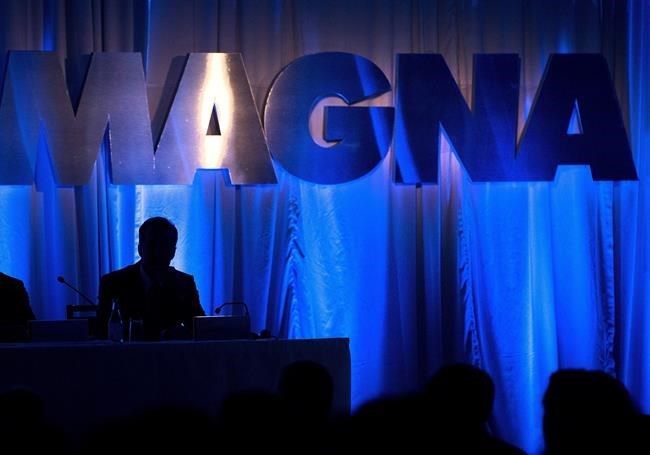AURORA, Ont. — A "precipitous decline" in global auto manufacturing during the COVID-19 pandemic led Magna International Inc. to report its first operating loss since 2009 on Friday.
Magna said COVID-19 shutdowns of automotive production caused a US$1.2 billion drop in its earnings and $5.5 billion hit to sales in the second quarter.
The autoparts maker says the impact was far worse than the quarterly declines during the 2008-2009 financial crisis as it lost US$647 million or $2.17 per diluted share in the second quarter, compared with a profit of US$452 million or $1.42 per share a year earlier.
Reporting in U.S. dollars, its adjusted loss was $1.71 per share, down from a $1.59 per share profit in the prior year.
Revenues for the three months ended June 30 plunged nearly 58 per cent to $4.3 billion, compared with $10.1 billion in the second quarter of 2019.
Magna was expected to report an adjusted loss of $1.57 per share on $4.1 billion of revenues, according to financial markets data firm Refinitiv.
The Ontario-based company says global light vehicle production was down 42 per cent while production in its two largest markets in North American and Europe were down 70 and 59 per cent respectively.
Cratering production led to job cuts and plant closures, the firm said, estimating cuts to its power and vision, body exteriors and seating groups cost about $168 million.
"In light of the suspensions of production earlier in the year, temporary layoffs of employees were inevitable," said a discussion and analysis document from Magna's management.
Although the company did use the Canadian government's wage reimbursement programs, the effect was a "net zero" for the company's bottom line, executives said.
"We have had to make some tough decisions, but that's business, and we'll be getting some payback on that," said chief executive Donald Walker on a conference call with financial analysts. "Overall, I am really happy with the efforts and the cooperation we saw throughout the company in a very difficult time trying to keep people safe and comfortable working, also on the execution of everything we are doing."
About 700 out of 152,000 Magna employees across the world contracted COVID-19, including 10 deaths, but the company said there were no confirmed cases to date of employee-to-employee transmission in workplace facilities.
"We have been reintegrating employees back into our plants and offices using our protocols, assessment tools and guidance documents. It was a monumental exercise to plan," said Walker. "I believe we responded extremely well to the challenge caused by the pandemic including being the leader for other industries to follow in terms of safe and successful operational restarts."
Other pressures on the business included a loss on an investment in ridesharing app Lyft Inc., and money set aside for potential social security taxes for workers who might be considered either employees or consultants.
However, the company did declare a 40 cent-per-share dividend and predicted it would reach sales of $30 billion to $32 billion in 2020, down from a January full-year sales forecast of $38 billion to $40 billion.
On a conference call with investors, executives noted that new technologies are key to profit margins going forward. They also touted a key hire, Sherif Marakby, who joined Magna as executive vice-president in July after serving as Ford Motor Company's head of autonomous vehicles.
"I'm really looking forward to seeing what the future brings in the area of new mobility, whether it's new customers or new products or new revenue revenue models," Walker said.
This report by The Canadian Press was first published Aug. 7, 2020.
Companies in this story: (TSX:MG)
The Canadian Press



